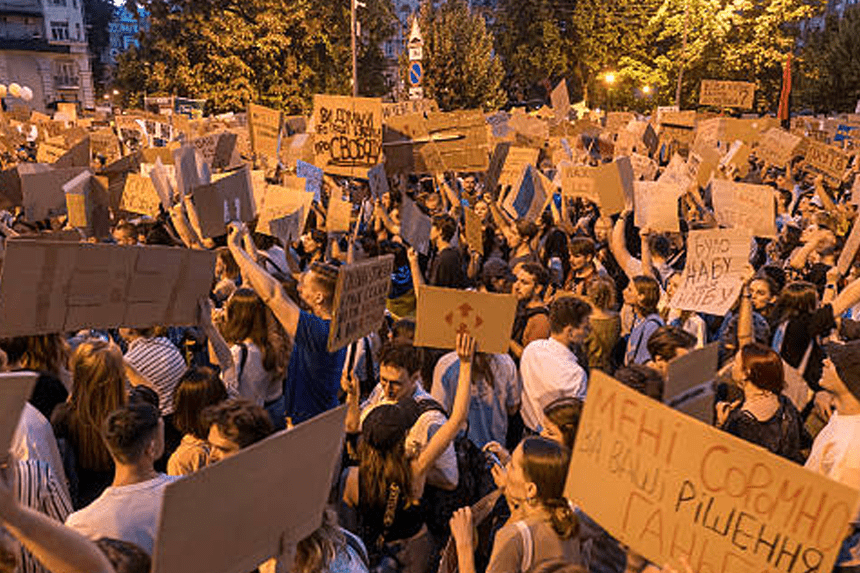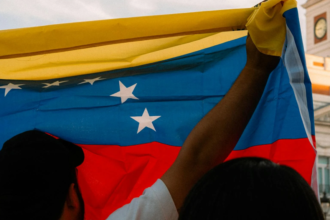Lawmakers in Ukraine’s parliament, the Rada, decided to get rid of a statute that President Volodymyr Zelensky had passed just a week before. The bill that caused a lot of debate undercut two important anti-corruption initiatives by making the National Anti-Corruption Bureau (NABU) and the Specialized Anti-Corruption Prosecutor’s Office (SAP) less independent.
- Why Did Zelensky Want to Change Agencies That Fight Corruption?
- How Important Are Anti-Corruption Changes to Ukraine’s EU Goals?
- What made Parliament change its mind so quickly?
- Did pressure from the public make the government change its mind?
- Are there more things that worry you about Zelensky’s leadership?
- What Would Happen If Ukraine Stopped Making Changes?
- Is the Crisis Over for Real?
The signs that the MPs held were the same as those that the protesters held all around Ukraine. For almost a week, young Ukrainians marched across cities and towns with one message: “Leave NABU and SAP alone.” Their public pressure worked. Not only did their actions stop a bad law, but they also started new conversations in the US and around the world about the country’s integrity and path to reform.
Why Did Zelensky Want to Change Agencies That Fight Corruption?
Zelensky’s law took away NABU and SAP’s power to go after high-level corruption on their own. The General Prosecutor, who was appointed by the president, was given such power. Critics said this would make investigations less fair.
This worried reformers and Ukraine’s Western partners. For a lot of demonstrators, fighting anti-corruption reforms was just as crucial as fighting Russia. It became clearer and clearer that democratic accountability and sovereignty are linked. One person who protested in Lviv stated, “You can’t make a fair country by making the institutions that hold leaders accountable weaker.”
This choice also risked turning off voters and civil society groups that wanted to see reforms and supported Zelensky when he first came to office in 2019. The president ran on an anti-corruption platform at first, but actions like this could have damaged that trust. The outcry showed how seriously Ukrainians increasingly take concerns about openness.
How Important Are Anti-Corruption Changes to Ukraine’s EU Goals?
Ukraine became a candidate for EU membership in 2022, but only after vowing to work to reduce corruption. Strong and independent anti-corruption reforms are very important for EU members and international donors. These changes are the most important part of Ukraine’s promise to uphold European democratic norms.
Ukraine’s economy is in bad shape because of the war; thus, it needs help from other countries. Support could slow down or stop if people don’t believe that reforms are making progress. This is especially important now that the EU wants to responsibly expand its borders. If Ukraine shows any signs of going back on its anti-corruption efforts, it could lose billions in aid and have to wait longer to join.
The EU also has a direct stake in making sure that the countries that will join it in the future are politically stable and have open economies. Donor weariness is a genuine thing, and if there are further worries about how Ukraine is being run, it might make other countries less likely to help it rebuild and defend itself. Read another article on Singapore Corruption: Race Gift Case
What made Parliament change its mind so quickly?
Lawmakers had supported Zelensky’s plan just 10 days before the U-turn. But protests changed the course of politics. On Thursday, MPs voted 331 to 0 to get rid of the law. This was a unanimous decision that showed how much pressure they were under from both their citizens and the rest of the world.
Zelensky then said, “There is no doubt that Ukraine is a democracy.” But a lot of Ukrainians are still not sure. People were happy by the quick change, but it didn’t make the unpleasantness of the proposition go away.
Some people think that Andriy Yermak, Zelensky’s head of staff, was very important. His position is dominant and not checked, which makes me worry even more about Ukraine’s commitment to democracy. Some experts have said that Yermak’s power could make it even harder to tell the difference between the executive branch and other institutions, particularly those that are supposed to fight corruption on their own.
Did pressure from the public make the government change its mind?
Yes. Young Ukrainians led the protests and wouldn’t be quiet. While their parents fight for the country in war, they fight for its future at home. They just asked for one thing: to keep the reforms that fight corruption.
The protests, which were planned on social media, quickly spread to large cities. Young people in Kyiv, Lviv, and Odesa carried placards, yelled slogans, and made it plain that they would not let corruption go unpunished.
“We’re staying here to protect our future, even though there are air raids,” stated a student protester in Kharkiv. That means institutions that are strong and honest. Their commitment, even while they were at risk of being hit by Russian missiles, showed a change in how people get involved in their communities.
Their activism reminded the administration that reforms are more than just things to do to get foreign help; they are promises that citizens are ready to fight for, even in times of conflict.
Are there more things that worry you about Zelensky’s leadership?
There are other worries. The government recently stopped Oleksandr Tsyvinski from being in charge of the Bureau for Economic Security. An independent group had chosen him. But the presidentially controlled security service wouldn’t let him get security clearance.
People know that Tsyvinski is in favor of changes to fight corruption. Many people think the action is politically motivated, especially since some of Zelensky’s friends are being looked into. The decision not to hire him, even though others suggested it, has simply made people more worried about politics being involved in allegedly impartial groups.
People who watch say that leaving out important appointments sends the wrong signals to both internal reformers and overseas partners. This makes me wonder: Is Ukraine devoted to reform, or are they just pretending to be?
What Would Happen If Ukraine Stopped Making Changes?
This issue is one of the biggest political problems since Zelensky became president in 2019. If the West stops helping, it may be very bad for the country, which has a projected budget imbalance of $13 billion next year.
The EU has already put off some financial help because things are moving too slowly. Protesters know this is a danger. They want a country where justice, not politics, rules.
If Ukraine doesn’t make changes to fight corruption, it could lose more than simply money. It could also lose credibility. Trust is incredibly important for rebuilding after a conflict. If you lose it, it will take longer and cost more to repair.
“We’re not just getting through this war,” stated a demonstrator in Dnipro. We’re constructing a future that is truly free and open. That vision includes a legal system that works and is autonomous, not one that is controlled by the executive branch.
Is the Crisis Over for Real?
Even though the statute was immediately overturned, there are still uncertainties. This event showed that there were problems within the organization and cast doubt on the leaders’ real plans for transformation.
To have a bright future, Ukraine needs to earn back people’s trust, both at home and abroad. Now, leaders need to show that they are serious about measures to fight corruption. Ukraine can only get long-term help and move closer to full EU membership after that.
The protests showed that civil society is still active and watchful. And that could be one of Ukraine’s best qualities during a war. If the government listens and keeps its commitments, the country will be stronger, more united, and closer to the democratic principles it wants to achieve. Guided by justice, not political shielding.
Without anti-corruption reforms, Ukraine may not just lose funding — it may lose credibility. Trust is a key currency in post-war recovery, and if lost, rebuilding institutions will take longer and cost more.
A protester in Dnipro said, “We’re not just surviving this war. We’re building a future with real freedom and transparency.” That vision includes a functioning, independent legal system, not one subjected to executive control.








